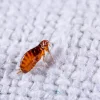Flea and Tick FAQ: Everything You Need to Know
1. What are fleas and ticks?
Fleas are small, wingless insects that feed on the blood of mammals and birds, whereas ticks are arachnids that latch onto the skin of their hosts to extract blood. Both can be problematic for pets and humans alike.
2. How do fleas and ticks affect pets?
Fleas and ticks can cause various health issues in pets, including skin irritations, allergies, and the transmission of diseases such as Lyme disease and Ehrlichiosis.
3. How can I tell if my pet has fleas or ticks?
Signs your pet may have fleas include excessive scratching, hair loss, and flea dirt (small black specks). Ticks can often be detected on your pet’s skin; they may appear as small, dark bumps.
4. What should I do if I find a tick on my pet?
Use fine-tipped tweezers to grasp the tick as close to the skin as possible and pull upward with steady pressure. Clean the area with antiseptic and monitor your pet for any signs of illness.
5. How can I prevent fleas and ticks on my pet?
Preventative measures include regular treatments using veterinarian-recommended flea and tick collars, topical treatments, or oral medications, as well as keeping your yard tidy and treating it for pests.
6. Can fleas and ticks pose health risks to humans?
Yes, both fleas and ticks can bite humans, leading to skin irritations, allergic reactions, and transmission of diseases such as Rocky Mountain Spotted Fever and flea-borne typhus.
7. How often should I treat my pet for fleas and ticks?
Follow the guidelines provided with your flea and tick prevention product. Generally, treatments should be given monthly, but consult your veterinarian for specific recommendations based on your pet’s needs.
8. Do fleas and ticks thrive in certain climates?
Fleas and ticks are more prevalent in warm, humid environments. However, they can survive in various climates, so it’s essential to maintain prevention regardless of location.
9. How can I get rid of fleas in my home?
Vacuum carpets, furniture, and pet bedding frequently. Wash pet bedding in hot water and use flea sprays or treatments recommended for indoor use to eradicate any remaining fleas.
10. Can I use human flea treatments on my pets?
No, many human flea treatments can be toxic to pets. Always use products specifically formulated for animals and consult your veterinarian for recommendations.
11. How long can fleas and ticks live without a host?
Fleas can survive a few days to several months without a host, depending on environmental conditions. Ticks can survive for several months to more than a year in a dormant state without feeding.
12. Are certain dog breeds more susceptible to fleas and ticks?
While fleas and ticks can affect any breed, some dogs with longer or thicker fur may be more likely to harbor ticks. Regular checks and grooming are essential for all breeds.
13. How can I tell if I’m allergic to flea bites?
Symptoms of an allergic reaction to flea bites include intense itching, red bumps, and swelling. If you suspect an allergy, consult a healthcare professional for evaluation and treatment options.
14. What natural remedies can I use to repel fleas and ticks?
Natural remedies include essential oils like lavender or cedarwood, diatomaceous earth, and vinegar solutions. However, consult with a veterinarian before using any home remedy on pets.
15. Can fleas and ticks be harmful to household items?
Yes, flea infestations can lead to damage to carpets and furniture. Ticks can also drop off pets and infect these areas, making regular cleaning and treatment essential.
16. How can I keep my yard flea and tick free?
Maintain a clean yard by trimming grass and clearing debris. Consider using insecticides, pet-safe treatments, or introducing beneficial nematodes to reduce flea and tick populations.
17. When should I seek veterinary help for flea or tick infestations?
Seek veterinary care if your pet shows signs of illness, such as lethargy, fever, or unusual behaviour after flea or tick bites. Prompt treatment is essential to prevent disease transmission.
18. Are there any specific products recommended for pets prone to allergies?
There are hypoallergenic flea and tick products available. Consult your veterinarian for the best options that suit your pet’s specific health needs.
19. Can I get fleas and ticks from my pet?
Yes, pets can bring fleas and ticks into the home, which can then infest your living space. Regular grooming and prevention are key to minimizing this risk.
20. How effective are flea and tick collars?
Flea and tick collars can be effective but vary by brand. They work best when used in combination with other preventative measures; always read the instructions carefully.



